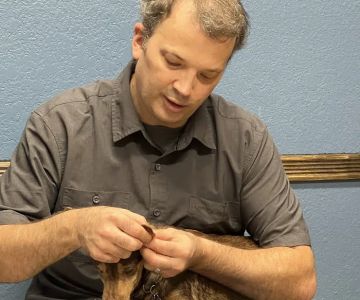Can a Veterinarian Become a Human Doctor? Exploring the Path from Veterinary Medicine to Human Healthcare
The question of whether a veterinarian can transition into becoming a human doctor is one that has intrigued many, especially those who are passionate about both animal and human healthcare. As someone deeply involved in the veterinary world, I have often wondered about the similarities and differences between veterinary and human medicine. Are the skills transferable? Could a veterinarian use their knowledge to treat human patients? In this article, I’ll dive into these questions and provide some clarity based on the training and professional paths in both fields.
1. The Foundation of Veterinary Medicine
To understand whether a veterinarian can become a human doctor, it's important to first look at the training and education involved in veterinary medicine. Veterinarians are highly trained professionals, equipped with a thorough understanding of animal physiology, anatomy, and medical practices. Their education typically includes a four-year undergraduate degree, followed by a four-year veterinary school program, where they learn to diagnose, treat, and prevent diseases in animals.
For example, my veterinarian, Dr. Smith, has spent years studying animal health, and I have seen firsthand how comprehensive her knowledge is in diagnosing my pets' health issues. While veterinarians focus on a variety of species, their core training is centered around animals. However, there are many shared principles with human medicine, such as the use of similar diagnostic tools, medications, and surgical techniques. Still, this doesn't immediately mean that a veterinarian can simply shift to treating humans.
2. The Training Path to Becoming a Human Doctor
On the other hand, human doctors, or physicians, follow a different path that requires additional years of education and training. After completing their undergraduate studies, they must attend medical school for another four years. Medical school is highly specialized and focuses exclusively on human anatomy, diseases, and treatments. After medical school, future doctors must complete a residency, which could take anywhere from 3 to 7 years depending on the specialty.
Thus, the path to becoming a human doctor is far more specialized compared to the veterinary path. This was a realization I had when discussing my thoughts with a friend who is a physician. He explained how much more complex human medicine is, particularly due to the need for deep knowledge in specialized areas like cardiology, neurology, and surgery. So, while a veterinarian might have a strong foundation in healthcare, the step from animal medicine to human medicine is not straightforward.
3. Shared Knowledge Between Veterinary and Human Medicine
Despite the differences, there are many similarities between the fields of veterinary and human medicine. Both professions require a deep understanding of biology, anatomy, and disease processes. A veterinarian, for instance, is trained to recognize patterns in symptoms and make decisions based on their knowledge of biology and pathology, similar to how a human doctor would approach a patient's symptoms.
In fact, there are cases where veterinarians have made significant contributions to human medicine. One example is the development of vaccines for rabies and leptospirosis, which were first tested on animals before being applied to human healthcare. My own experience working with veterinarians has shown me how they are highly skilled in understanding complex medical scenarios and applying critical thinking in ways that align closely with what human doctors do.
4. The Challenges of Transitioning from Animal to Human Medicine
However, there are clear distinctions that prevent veterinarians from easily becoming human doctors. The primary challenge is the difference in physiology between humans and animals. While veterinarians understand how to treat various animals, human physiology has unique complexities that require extensive training in human-specific diseases and treatments.
Moreover, human medicine involves a more intricate understanding of human-specific issues, including psychological aspects, ethical dilemmas, and complex social factors. The regulatory and legal frameworks governing human medicine also differ from those in veterinary care. The transition from one field to another would therefore require a complete overhaul of a veterinarian's knowledge base and practice methods. This makes it evident that becoming a human doctor requires far more than just an understanding of medicine in general—it requires specific, focused education in human healthcare.
5. Could a Veterinarian Become a Human Doctor? The Answer is Complicated
In short, while there are shared skills between veterinarians and human doctors, a veterinarian cannot simply transition into human medicine without additional extensive training. The fundamental differences between the two fields, especially when it comes to human-specific treatments and diseases, require that a veterinarian go through the entire medical school process if they wish to become a physician. In most cases, veterinarians would need to apply to medical school, complete the necessary coursework, and then undergo residency training.
That being said, the skills veterinarians gain during their education and practice can certainly be valuable. They have a deep understanding of disease prevention, diagnostics, and even surgery, all of which could serve them well if they decide to pursue a medical career for humans. I have often heard stories of veterinarians who went on to become medical professionals, though it takes dedication and a willingness to start over in many aspects of their education.
6. A Personal Perspective: My Experience with a Veterinarian Who Became a Physician
One of the most fascinating stories I’ve heard about this transition comes from a close friend of mine, who is both a trained veterinarian and a licensed medical doctor. She shared with me how she started her career as a veterinarian and, over time, realized that she wanted to pursue human medicine. After many years of additional schooling, she successfully became a physician, specializing in pediatrics. Her journey was long and filled with challenges, but it also reflected her dedication to the healing profession. What impressed me most was how her veterinary background gave her a unique perspective on patient care, allowing her to connect with her human patients in ways others couldn't.
This example highlights that, while the transition from a veterinarian to a human doctor is not simple, it is not impossible for those who are passionate about both fields and willing to invest the time and effort into the required training.
SEO Title: Can a Veterinarian Become a Human Doctor? Exploring the Path to Human Medicine SEO Keywords: veterinarian to human doctor, veterinary medicine, human medicine transition, veterinary career path, becoming a doctor SEO Description: Discover the challenges and similarities between veterinary and human medicine. Learn why a veterinarian might need to undergo additional training to become a doctor.










